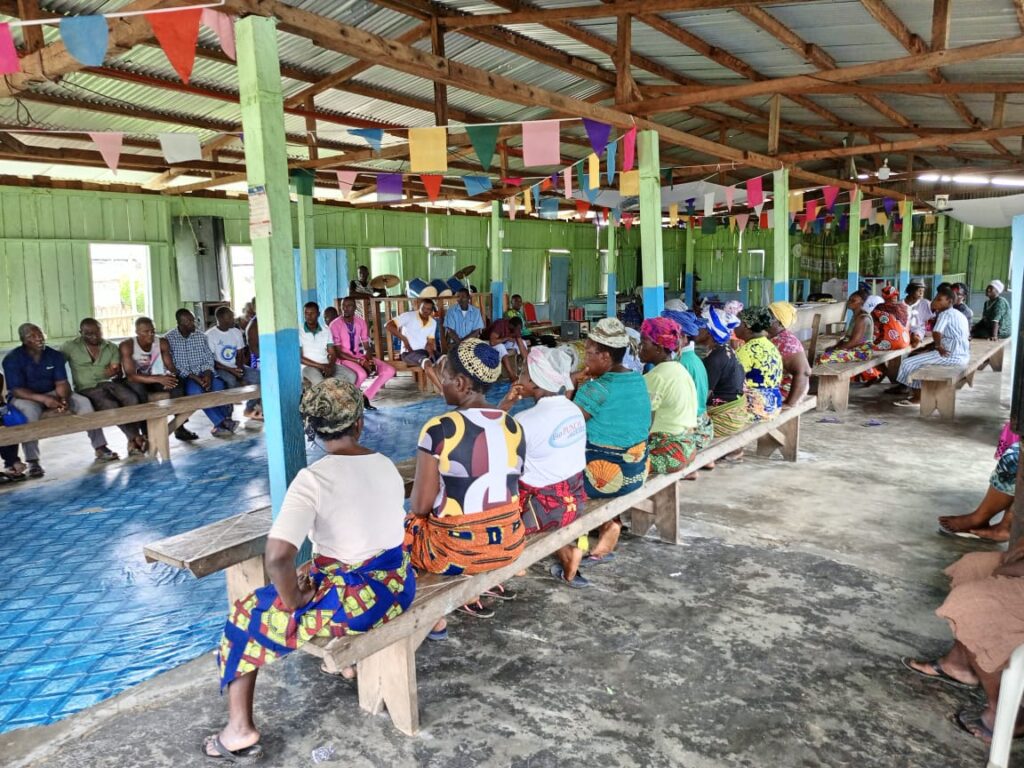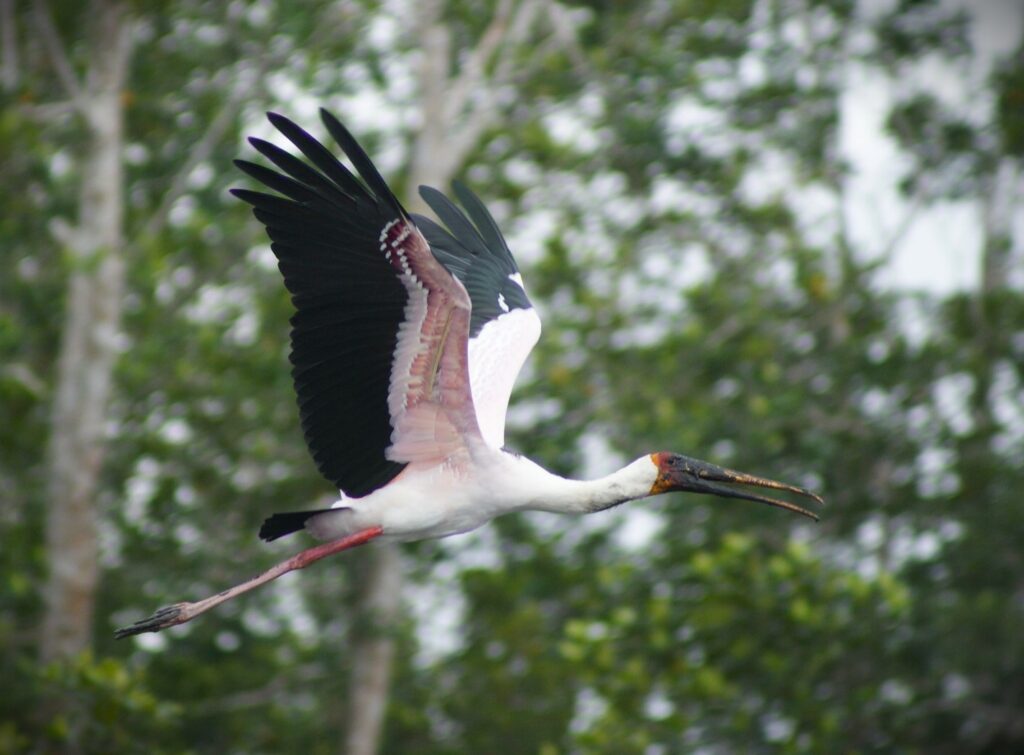Q&A: Godefroy de Bruyne Central Africa Marine Coordinator, Wildlife Conservation Society
Blog
The waters of the coast of Gabon and the Republic of Congo (Congo) are an important transition area between the warmer, more turbid waters of the Gulf of Guinea and the cooler waters of southern Africa. These conditions create an upwelling zone that supports some of the most productive fisheries in the world, harbors globally important populations of sea turtles, and provides habitat for more than 70 species of sharks and rays.
The region’s biodiversity is threatened by overfishing by industrial foreign fishing fleets and unregulated, often illegal exploitation. In recognition of this threat, Gabon and Congo are taking action to establish protections for the Gulf of Guinea. With 30+ years of experience in the region, the Wildlife Conservation Society (WCS) has collaborated closely with both governments to champion the creation of ocean conservation areas in Gabon and the Republic of Congo, including establishing a transboundary park.
In partnership with WCS, the Blue Nature Alliance supports efforts in Gabon and Congo to strengthen the management of existing and proposed ocean conservation areas. At the center of this engagement, which includes activities to support management agencies and advance the operationalization of community fishing zones, is a robust scope of work in support of Gabon’s rangers and marine park management staff, to improve access to training, provide essential equipment, and increase the frequency and range of patrol operations.
In this Q&A, we hear Godefroy de Bruyne, WCS’ Central Africa Marine Coordinator and the lead for the work in partnership with the Alliance.
Can you tell us a little about your background in marine conservation and what led you to your current role at WCS and the work in partnership with the National Parks Agency (ANPN)?
I completed my master’s degree at Aix-Marseille University in management of aquatic ecosystems. Then, after working in Canada and France, I volunteered for a mission with WCS-Gabon, in Mayumba, a remote village in the south of Gabon, close to Mayumba National Park. In Mayumba, I learned to work with artisanal fishermen, live in central Africa, and embrace the marine conservation efforts led by WCS and the Government of Gabon. For the next twelve years, I worked along the coast of Gabon and Congo as a technical assistant with two government initiatives, Gabon Blue and Congo Marine. Through these projects, WCS developed strong partnerships with key administrations, including park agencies and the fishing administrations. WCS continues to reinforce the capacity and skills of the staff at these bodies to face marine conservation challenges.

Why is it important to prioritize ranger capacity building and safety in MPA management?his work at the Street Whale festival in 2023
While rangers have long focused on terrestrial issues, such as poaching or illegal mining, marine biodiversity, and the threats it faces have been largely unknown, as have the available solutions to counter these threats. As a result, the ocean can be like the Wild West, where extractive activities are conducted with limited oversight or respect for national or international laws.
Industries, including industrial fishing and mining, have benefited from this as less control maximizes their economic benefit. However, these activities have a heavy impact on marine ecosystems through the destruction of habitat, recurrent oil pollution, and the depletion of fishing stocks, causing conflict between artisanal and industrial fishers. These impacts have hit coastal and inland communities that depend on the ecosystem services provided by the marine environment, such as food, landscapes, culture, and tourism.
To reverse the tide of these impacts, government administrations, from top to bottom, need to understand the environmental risks and livelihood impacts of marine activities, as well as the considerations for providing marine rangers a safe environment to work and live. Moreover, all stakeholders must understand why it is important to protect the ocean and how they can help to do it.
“We are very engaged in the protecting our natural resources and biodiversity, now the main thing we have to do now is increase our knowledge and available science to look at what we are protecting and understand how we can protect it better.” - Hubert Ella Ekogha, APNP special counsel to the president and technical director.
In French, we have an expression ‘a man aware is worth two,’ which highlights the importance of building the knowledge and capacity among rangers and conservation staff to address the impacts above. In my years of working in Gabon, I have seen the capabilities of rangers, conservationists, and local students rise far beyond where they were when I began. We now aim to achieve the same in Congo as we continue to work in both countries and beyond.

Are you seeing changes on the water as a result of the support from the Blue Nature Alliance?
We have observed changes across the sites receiving surveillance support from the Alliance, as areas with increased patrol efforts have seen a reduction in the number of illegal activities and, consequently, a reduction of pressure on those ecosystems. Moreover, with funds to conduct patrols, the park agency can better regulate fishing, monitor pollution, and assist in the case of an emergency. Financing patrols also allows the rangers to be in the field, connecting with the local communities and the environment they protect. The Alliance’s support to WCS is appreciated, especially as we engage in the ongoing process of updating park management plans which incorporate data collected in the field.
In Congo, changes are more subtle as we focus on completing capacity needs assessments and corresponding capacity-building plans for the government. During our last workshop , which covered marine ecology, MPAs, and CITES, we saw noticeable changes in how the participants approached these topics. For instance, participants from the Coast Guard, Navy, and fishery administration worked together to establish priorities for marine conservation in Congo, and participants were eager to implement changes. We see this changing mentality as the first step to achieving sustainable marine conservation.
Additionally, we’ve seen the official creation of three MPAs along the coast of Congo, including one along the border with Gabon (Conkouati-Douli National Park). Because of this success, WCS has been selected as the lead NGO for future marine conservation efforts in Congo.
What are the next steps to step up your efforts in the area with the support of the Blue Nature Alliance?
Our next step is to expand work on a regional level, using the example of transboundary conservation between Congo and Gabon as a case study. So far, agreements between the two countries exist on paper, but as is planned in this project, we need to update them and bring them into implementation. In the meantime, WCS continues to advance efforts around capacity building, surveillance and enforcement, scientific research, and construction and maintenance of infrastructure to improve the welfare of coastal communities.

Both countries have the potential to serve as marine conservation leaders in the subregion, which ranges from Cameroon to Angola and includes São Tomé and Príncipe Island. The region, linked by the Guinea Current, includes shared fishing stocks (tuna, sardines, threadfins, otoliths) and serves as a corridor for sensitive marine species (sharks and rays, marine turtles, and whales). Unfortunately, the region is also linked by shared threats, such as IUU fishing, the marine oil industry, piracy, and climate change, and to face these threats, we need to move beyond the national approach to embrace a regional strategy.
How do you hope the work in Gabon will influence the broader marine conservation community?
The work already benefits Gabon’s close neighbors, first Congo, and now also Sao Tomé and Equatorial Guinea. Thanks to the Gabon Blue Initiative, as well as the positions taken by Gabon during international convenings, Gabon is recognized as a leader in marine conservation and an inspiration to other countries facing significant challenges to their marine ecosystems. Moreover, Gabon is preparing to advance new sustainable financing mechanisms, which will be an innovation for the region, and we are hopeful it will allow government and civil society stakeholders to cover the costs and activities related to marine conservation.
